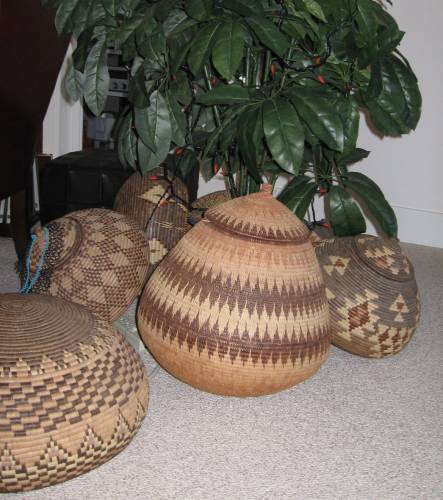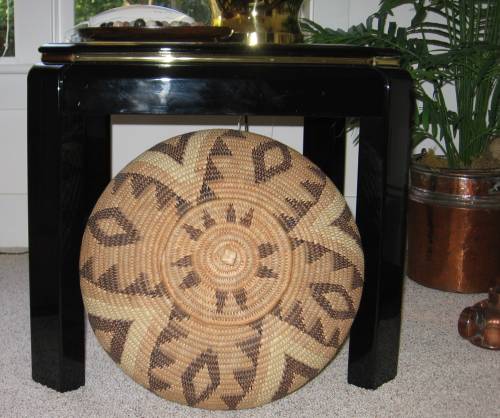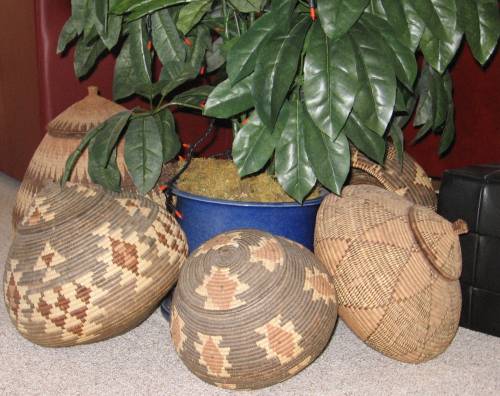
|
The Magic |
Bagging the Baskets Upon returning to Ujeanne from our South Africa Education Tour we began the final component of our project. One of the vivid images of our visit was native hand work of South African Zulu women. We say native with due respect because the art work was created from start to finish by women who lived on small farms located in rural South Africa. Often their homes were small, grass, one room dwellings. The women harvested the wild grasses growing on the open fields, sorted and dried them and then dyed them with dyes they produced from natural materials. The colors are subtle, the patterns vivid.
The first hurdle, however, was market research. Would the artifacts, particularly the baskets, sell once we had a sample available in the US? What we recall clearly is the extent of our naivete regarding marketing and sales. Whoooee! We discovered a marketing center in Los Angeles, a large stainless steel and glass multi-story building. We were able to piggy back a visit to this LaLa Land Emporium onto a consulting trip to LA. Each floor specialized in specific kinds of imported products and we located what seemed to be the most likely locations for our SA baskets. The first discovery was that there were many basket importers from around the world. Bad news? Depends on the second discovery; there were few from South Africa, at least few that resembled the style of basketry we had in mind, and the prices of those on display were “high end”.
We were also considering relocating to the US Southwest, and so extended our market research to the Phoenix and Tucson areas. As any fool should have known, Arizona is the homeland for many Indian Tribes and thus a considerable source of Indian Baskets. Some, unfortunately for us, were similar in design and appearance to our product. None we thought were up to the quality of our baskets, but it was also probably true that potential buyers could not tell the difference. Another revelation was the marketing trail, to coin a phrase. Most Arizona retailers we contacted considered baskets a minor component of their inventory and already had their wholesalers well identified and locked in. We were not welcomed with open, let alone even hesitant, arms. We decided to explore and expand the product line and turned to an array of African yarns. These were exquisite, but alas the market was flooded with pretty yarns. And we soon learned we didn’t know tiddly squat about weaving or weavers. The next step in our education as marketers was to put on our six guns and go for broke, which in this instance involved renting a display room at the Valley River Inn, doing a mailing to a list of friends, getting a receipt book and finding out if we could draw anyone to a sale. We rented a truck for the next Saturday and as we were transferring the inventory from our garage to the sale site, Jack was attacked by a huge flu bug. Somewhere in that sequence of events it occurred to us that selling to friends was really tacky, so we reduced prices and marched on though the jungle of commerce, Zulu baskets, shields and swords and flu medicine in hand. We pushed on, held the sale, and sold a goodly part of our test inventory. A surprising outcome was identifying several people who had standing interests in collecting Zulu baskets and within several weeks sold most of our basket, rug and wall hanging inventory. We have been decorating our home with the remaining Zulu baskets ever since. As much as we enjoy the basketry we appreciate even more the personal lesson we learned about ourselves and the misfit with commerce. Peddling the yarn was the low point. For that matter, peddling anything that the potential buyer has no need for let alone interest in was degrading. There must be a challenge in the seller-buyer relationship for some but it whizzed right by both of us. It still appeared that wholesale is substantially different than retail. The latter is so personal and imposing whereas wholesale could more likely be turned into an exercise in strategy and all that implies. A game, but not nearly as personal. We resolved all of this by sending the following memo to those on the Out of Africa Mailing list. OUT OF AFRICA IMPORTS BAGGING OUR BASKETS... Our collection of South African basketry has not sold as well as our Los Angeles, Palm Springs and Beverly Hill consultants suggested. Consequently, we are going to bag the baskets (as well as the consultants)! All African baskets, rugs, wall hangings and other items are offered for sale at a whopping 60 % discount. That’s below wholesale, for gosh sakes! The event happens next Saturday afternoon at our Garage on Lochmoor Place. That’s a right at the Willamette and 46th street traffic light, or robot as they say in SA, up the hill and hang a right on Lochmoor. Park in the circle or there about. A guide will meet you and lead you to the final destination. We hope you will come. Clearing out our African Basket inventory will make room for the exciting collection of Maori war canoes we expect to arrive in June, assuming the warriors have sufficient stamina. Theresa and Jack
Believe it or not, the several “Collectors” continued to manifest their interests in baskets, and eventually purchased remaining specimens, leaving us a small attractive collection of varied sized and shaped baskets. As for the less tangible outcomes of the tour, the contacts we met did not last long. The South African political situation showed brief signs of improving but according to personal reports these were short lived, the vocational guidance movement ran out of steam and the contacts we made with South African Graduate students faded away. Dr. Barry Beck retired and resides increasingly in France, one student eventually earned a graduate degree and relocated to the United States. Another completed a masters degree at Oregon and returned to a teaching position in South Africa. He was a very quick study and an excellent student. He mounted an assertive application effort to doctoral program United States based universities. We must have written over 50 letters of reference on his behalf. Then, suddenly contact with him ceased. We knew he married and had a child shortly after his return to South African, but that was the last sign of him. Some who knew the South African situation better than did we speculated that he could have been killed. He was a kind and open person, but probably too trusting. As is true in many difficult cultures, survival of the fittest is a complex construct. We both recall where we were February 11, 1990 when Nelson Mandela was released from prison. We eyed the TV screen and then one another and said, “Now, will it all change?”
|

 Other artifacts included wood carvings, rock carvings, ceremonial clothing, rugs, knives and child apparel. What struck us as most unique were the woven baskets. They were also relatively light and thus more easily transportable. Our project was a cooperative effort with a South African company organized by Dr. Beck and United Learning Corporation. The working title was “Out of Africa Imports”. The essence of the plan was that Beck’s company would identify sources of baskets and other artifacts, arrange for purchasing them, ship them to the US and United Learning Corporation acting as Out of Africa Imports would be responsible for US customs arrangements, market research and wholesaling the items in the US market. Should the project be financially profitable, we hoped to sponsor educational opportunities for South African students.
Other artifacts included wood carvings, rock carvings, ceremonial clothing, rugs, knives and child apparel. What struck us as most unique were the woven baskets. They were also relatively light and thus more easily transportable. Our project was a cooperative effort with a South African company organized by Dr. Beck and United Learning Corporation. The working title was “Out of Africa Imports”. The essence of the plan was that Beck’s company would identify sources of baskets and other artifacts, arrange for purchasing them, ship them to the US and United Learning Corporation acting as Out of Africa Imports would be responsible for US customs arrangements, market research and wholesaling the items in the US market. Should the project be financially profitable, we hoped to sponsor educational opportunities for South African students.
